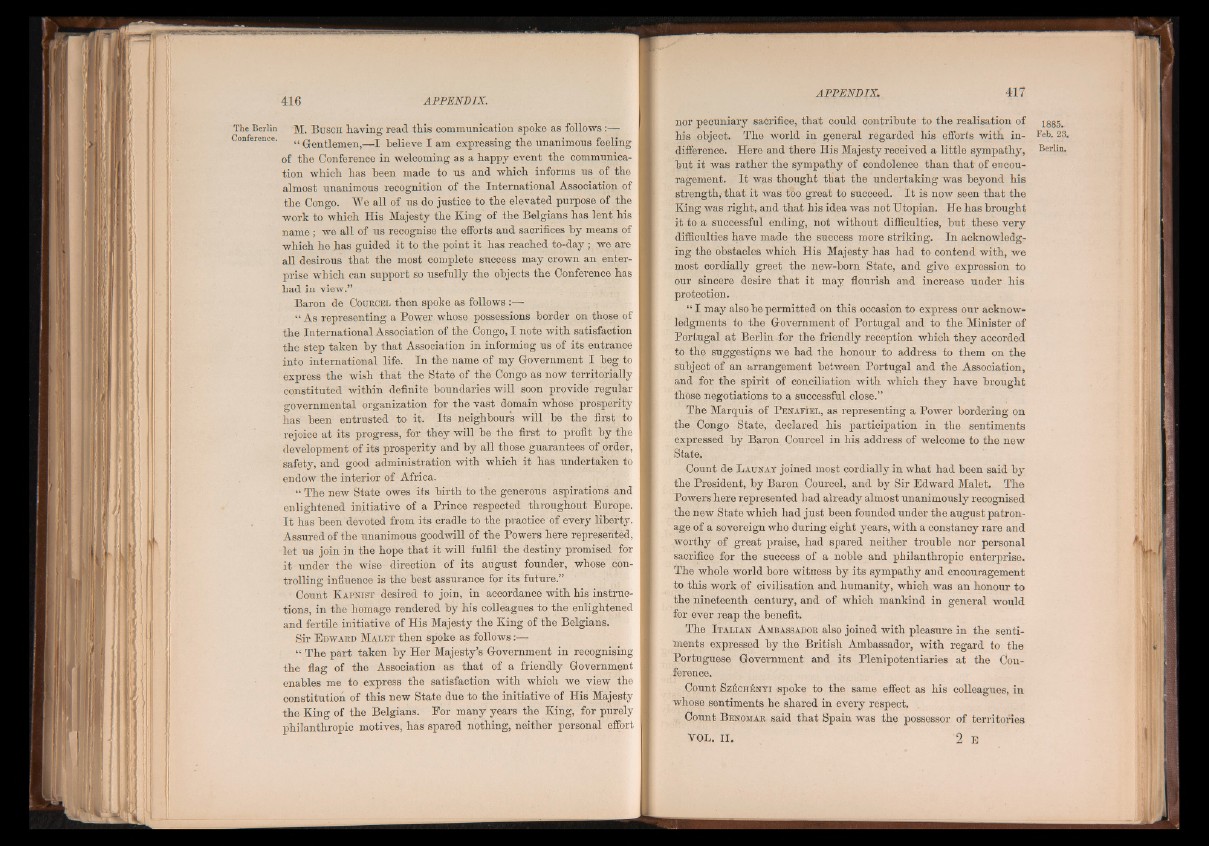
M. B usch h a v i n g r e a d t h i s c o m m u n i c a t io n s p o k e a s fo llo w s :—
“ Gentlemen,—I helieve I am expressing the unanimous feeling
of the Conference in welcoming as a happy event the communication
which has been made to us and which informs us of the
almost unanimous recognition of the International Association of
the Congo. We all of us do justice to the elevated purpose of the
work to which His Majesty the King of the Belgians has lent his
name ; we all of us recognise the efforts and sacrifices by means of
which he has guided it to the point it has reached to-day ; we are
all desirous th a t the most complete success may crown an enterprise
which can support so usefully the objects the Conference has
had in view.”
Baron de Couecel then spoke as follows :—
“ As representing a Power whose possessions border on those of
the International Association of the Congo, I note with satisfaction
the step taken by th a t Association in informing us of its entrance
into international life. In the name of my Government I beg to
express the wish th a t the State of the Congo as now territorially
constituted within definite boundaries will soon provide regular
governmental organization for the vast domain whose prosperity
has been entrusted to it. Its neighbours will be the first to
rejoice at its progress, for they will be the first to profit by the
development of its prosperity and by all those guarantees of order,
safety, and good administration with which it has undertaken to
endow the interior of Africa.
“ The new State owes its b irth to the generous aspirations and
enlightened initiative of a Prince respected throughout Europe.
I t has been devoted from its cradle to the practice of every liberty.
Assured of the unanimous goodwill of the Powers here represented,
let us join in the hope th a t it will fulfil the destiny promised for
i t under the wise direction of its august founder, whose controlling
influence is the best assurance for its future.”
Count K a pn is t desired to join, in accordance with his instructions,
in the homage rendered by his colleagues to the enlightened
and fertile initiative of His Majesty the King of the Belgians.
Sir E dw a ed M a l e t t h e n s p o k e a s f o llo w s
“ The pa rt taken by Her Majesty’s Government in recognising
the flag of the Association as th a t of a friendly Government
enables me to express the satisfaction with which we view the
constitution of this new State due to the initiative of His Majesty
the King of the Belgians. Eor many years the King, for purely
philanthropic motives, has spared nothing, neither personal effort
nor pecuniary sacrifice, th a t could contribute to the realisation of ig85.
his object. The world in general regarded his efforts with in- Feb. 23.
difference. Here and there His Majesty received a little sympathy, Berlin,
but it was rather the sympathy of condolence th an th a t of encouragement.
I t was thought th a t the undertaking was beyond his
strength,- th a t it was too great to succeed. I t is now seen th a t the
King was right, and th a t his idea was not Utopian. He has brought
it to a successful ending, not without difficulties, but these very
difficulties have made the success more striking. In acknowledging
the obstacles which His Majesty has had to contend with, we
most cordially greet the new-born State, and give expression to
our sincere desire th a t it may flourish and increase under his
protection.
“ I may also be permitted on this occasion to express our acknowledgments
to the Government of Portugal and to the Minister of
Portugal a t Berlin for the friendly reception which they accorded
to the suggestions we had the honour to address to them on the
subject of an arrangement between Portugal and the Association,
and for the spirit of conciliation with which they have brought
those negotiations to a successful close.”
The Marquis of P e n a f ie l , as representing a Power bordering on
the Congo State, declared his participation in the sentiments
expressed by Baron Courcel in his address of welcome to the new
State.
Count de L au n a y joined most cordially in what had been said by
the President, by Baron Courcel, and by Sir Edward Malet. The
Powers here represented had already almost unanimously recognised
the new State which had ju st been founded under the august patronage
of a sovereign who during eight years, with a constancy rare and
worthy of great praise, had spared neither trouble nor personal
sacrifice for the success of a noble and philanthropic enterprise.
The whole world bore witness by its sympathy and encouragement
to this work of civilisation and humanity, which was an honour to
the nineteenth century, and of which mankind in general would
for ever reap the benefit.
The I t a l ia n A mbassadoe also joined with pleasure in the sentiments
expressed by the British Ambassador, with regard to the
Portuguese Government and its Plenipotentiaries a t the Conference.
Count SziiCHiiNYi spoke to the same effect as his colleagues, in
whose sentiments he shared in every respect.
Count B enomae said th a t Spain was the possessor of territories
VOL. I I . 2 E